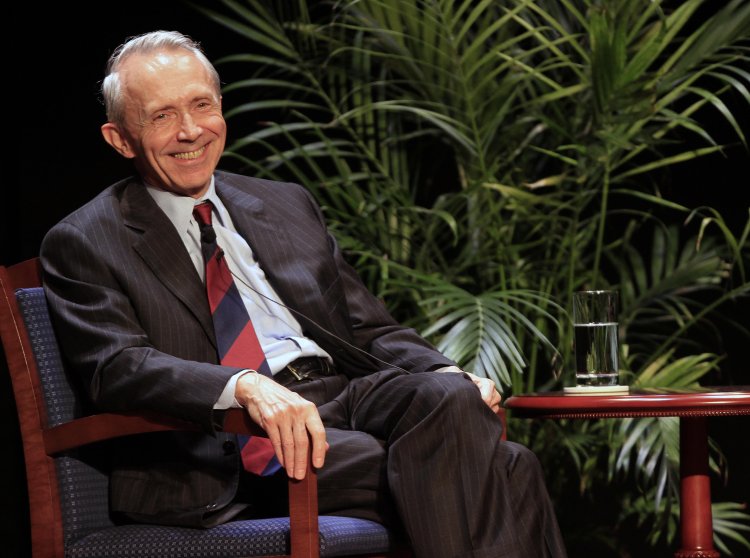David Souter, Ex-Supreme Court Justice, Dies at 85
Renowned for his independent perspective, he served as a notable voice on the Supreme Court.

He was 85.
"Justice David Souter served our Court with great distinction for nearly twenty years. He brought uncommon wisdom and kindness to a lifetime of public service," Chief Justice John Roberts stated on Friday.
At the time of his nomination by President George H. W. Bush in 1990 to succeed the retiring Justice William Brennan, Souter was an obscure figure on the national stage. Brennan had been a key member of the court’s liberal bloc for over three decades. Initial expectations were that Souter would tilt the court significantly to the right, but he quickly proved to be an independent force.
“Souter was confirmed October 2, 1990, by a 90-9 vote,” noted John J. Sullivan in "The Supreme Court Justices" (1995). “He has since emerged as the intellectual leader of the Court’s centrist coalition, often carving out a middle ground for other justices to join. A moderate pragmatist, Souter shows a strong respect for precedent.”
In the 1992 case Planned Parenthood of Southeastern Pennsylvania v. Casey, Souter joined Justices Sandra Day O’Connor and Anthony Kennedy in an opinion that upheld the precedent set by Roe v. Wade. This ruling modified the landmark 1973 decision on abortion, allowing states greater authority to impose restrictions while maintaining the central tenets of Roe, aiming to preserve the credibility of the Court.
“To overrule under fire in the absence of the most compelling reason to re-examine a watershed decision would subvert the Court's legitimacy beyond any serious question," the trio wrote. This ruling remained intact until it was fundamentally undermined by the Dobbs v. Jackson Women’s Health Organization case in 2022.
As time went on, Souter increasingly aligned with the liberal justices on the Court. He became another example of a Republican appointee who did not fulfill the expectations of the president who nominated him or the conservatives who supported his appointment, joining the ranks of Earl Warren, Harry Blackmun, John Paul Stevens, and Brennan.
However, many appreciated his pragmatic approach. "He approached judging as he approaches life, with a feverish work ethic and a good sense of humor, with integrity, equanimity and compassion," President Barack Obama remarked upon Souter's retirement in 2009, highlighting his qualities as a judge and a person.
David Hackett Souter was born on September 17, 1939, in Melrose, Massachusetts. He spent a significant portion of his childhood in Weare, a rural town in New Hampshire. After being named “most likely to succeed” at Concord High School, he attended Harvard and became a Rhodes Scholar, later becoming only the third Rhodes Scholar to serve on the Supreme Court, following John Marshall Harlan II and Byron White.
Souter returned to Harvard to pursue a law degree after his studies in England. He began his career in private practice before joining the state Attorney General’s office in 1968. Three years later, he was appointed deputy Attorney General by Warren Rudman, later succeeding him in 1976.
Souter subsequently held positions as an associate justice on the New Hampshire Supreme Court and briefly on the U.S. Court of Appeals for the First Circuit.
When Brennan left the Supreme Court in 1990, Rudman, now a U.S. senator, encouraged White House chief of staff John H. Sununu, a fellow New Hampshire Republican, to advocate for Souter’s nomination. At that time, Bush aimed to avoid a contentious confirmation fight like the one that had derailed Robert Bork's nomination in 1987.
Souter, sometimes labeled a “stealth” nominee, was significantly less well-known and controversial than Bork.
“When Souter was nominated, he was as little-known as any nominee could be,” Jeff Greenfield wrote in 2018.
During his confirmation hearing, Souter articulated key elements of his judicial philosophy. “The first lesson, simple as it is, is that whatever court we are in, whatever we are doing, whether we are in a trial court or an appellate court, at the end of our task some human being is going to be affected,” he told the Senate Judiciary Committee.
The Senate confirmed him by a vote of 90-9. “He's just exactly the kind of person with a broad background that we need on the Supreme Court,” said Sen. Orrin Hatch in support of Souter. However, Sens. Alan Cranston and Brock Adams opposed him for his refusal to share his stance on abortion.
The 1992 case Planned Parenthood of Southeastern Pennsylvania v. Casey soon placed that issue in the spotlight. The Supreme Court was expected to use it to overturn Roe v. Wade but instead, the O’Connor-Kennedy-Souter trio leveraged the decision to affirm the importance of precedent.
“When announcing decisions from the bench, Justices usually offer a summary or read brief excerpts,” the New York Times reported. “On this morning, however, each of the three — first O'Connor, then Kennedy and finally Souter — orally delivered major portions of the trio opinion. Journalists quickly realized they were witnessing an unprecedented event.”
The Times further noted, "The most eloquent section of the opinion was the discussion of Roe and the principle of stare decisis — Latin for judicial respect of existing precedent — that had been crafted principally by David Souter."
In 2000, Souter was one of four justices who voted in Bush v. Gore to allow Florida's election recount to proceed. The majority's decision to halt the recount effectively secured Republican George W. Bush's victory over Democrat Al Gore. Writer Jeffrey Toobin later suggested that the “crudely partisan” ruling disturbed Souter so much that he contemplated resignation.
Souter became a strong advocate for the First Amendment, particularly regarding free speech and the separation of church and state. In 1992, for example, he dissented in Cohen v. Cowles Media Company, where a confidential source sued for being exposed by the publication that had received information from him. “Freedom of the press is ultimately founded on the value of enhancing such discourse for the sake of a citizenry better informed and thus more prudently self-governed,” he wrote.
In 2005, he authored the majority opinion in McCreary County v. American Civil Liberties Union, a 5-4 ruling declaring displays of the Ten Commandments in two Kentucky courthouses unconstitutional. The following year, he dissented in Garcetti v. Ceballos, arguing in favor of the free speech rights of public employees in their official capacities.
Souter supported the majority in Kelo v. New London, a 2005 case that upheld the government's use of eminent domain to take private property. Activists upset by the decision proposed seizing Souter’s farmhouse in Weare, New Hampshire, to create the “Lost Liberty Hotel.”
"The justification for such an eminent domain action is that our hotel will better serve the public interest as it will bring in economic development and higher tax revenue to Weare,” wrote Logan Darrow Clements. Ultimately, in March 2006, Weare's voters rejected the proposal to seize Souter's property.
Souter was widely regarded as a mild-mannered Yankee, although court observers noted he possessed a more colorful personality.
“Souter has developed a reputation as a charming wit,” Sullivan commented, adding that he had a wry sense of humor and often entertained colleagues and visitors with tall tales. Despite moving to Washington, D.C., Souter maintained his New England traits, forgoing an overcoat even in winter and bringing his lunch to work. At night, he often enjoyed long runs.
In 2004, Souter was assaulted while jogging in Washington, although he sustained only minor injuries and there was no evidence suggesting it was a targeted attack.
Souter also retained his affinity for New Hampshire while resisting many technological advances.
"Rather than fly home, Souter preferred to drive,” Nina Totenberg explained in 2009. “He also resisted other forms of contemporary technology and convenience, holding out against the cell phone and e-mail and continuing to write his opinions and dissents in longhand, using a fountain pen.”
On May 1, 2009, President Barack Obama announced Souter’s plan to retire at the end of that term.
“I wish him safe travels on his journey home to his beloved New Hampshire and on the road ahead,” Obama said.
After his retirement, Souter returned to hear cases on the First Circuit Court of Appeals. In a 2013 case, he wrote an opinion that removed a judge from the trial of notorious Boston mobster James "Whitey" Bulger, stating, “It is clear that a reasonable person might question the judge's ability to preserve impartiality.”
Although largely out of the public spotlight, Souter became a cautionary example for conservatives regarding the risks of poorly vetted judicial appointments. The Federalist Society, in particular, aimed to create lists of potential justices to avoid surprises like Souter. “It was such a different world then, which he personified," remarked Carl Tobias, a law professor, reflecting on Souter's appointment in 2018.
Conversely, others remembered Souter fondly for what he represented. Following the 2022 Dobbs ruling, an emeritus professor at the University of Chicago School of Law praised Souter’s conduct on the high court three decades prior.
“No one has proposed him for sainthood,” Timothy O’Neill wrote. “No one has a bobble-head of Justice Souter. No one cloyingly refers to him as ‘DHS.’ But Justice Souter exemplifies the kind of humility and grace that receives scant attention in our celebrity-driven, 24/7 news-cycle world.”
Ian Smith for TROIB News












